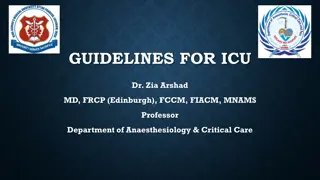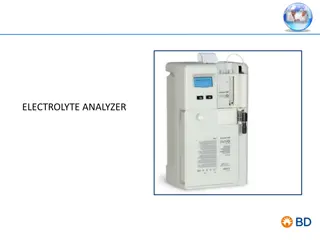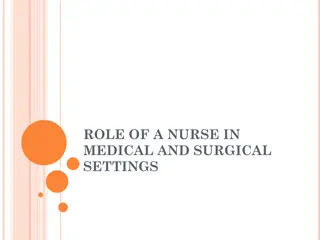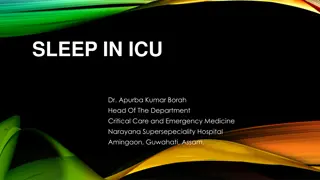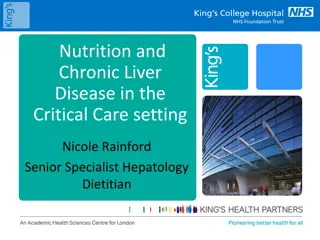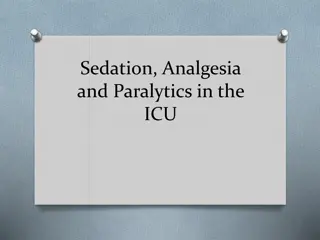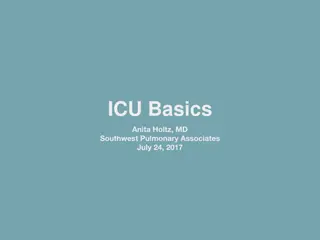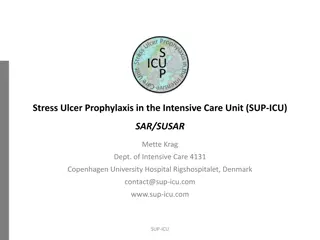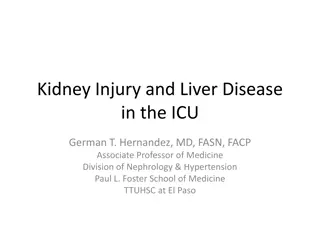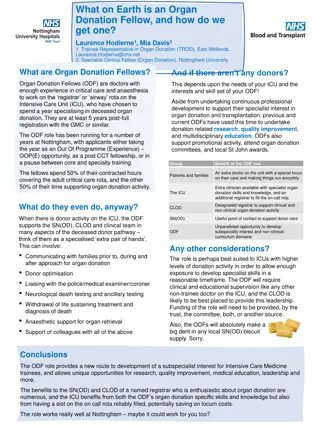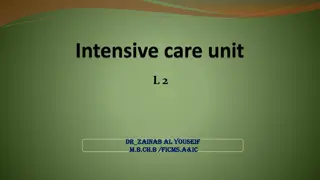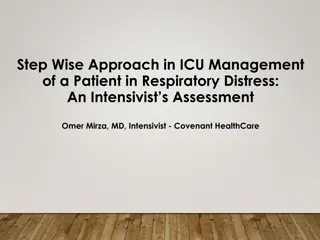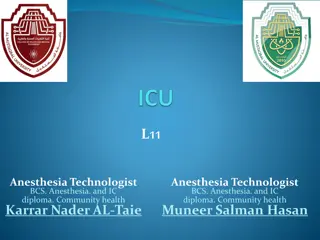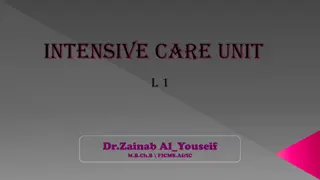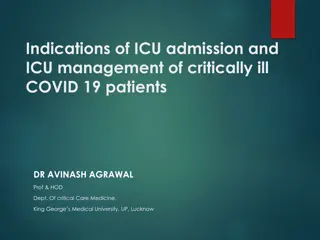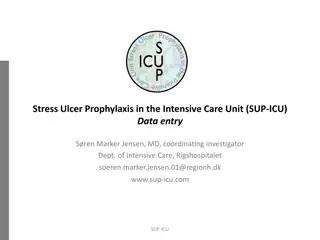Comprehensive ICU Protocol for Sedation, Analgesia, and Delirium Control by Dr. Vinod Srivastava
This comprehensive ICU protocol by Dr. Vinod Srivastava, an Associate Professor in Anaesthesiology & Critical Care at KGMU, covers key aspects such as sedation, analgesia, delirium assessment and control, stress ulcer and deep vein thrombosis prophylaxis, and glycaemic control in the ICU setting. Th
1 views • 50 slides
Guidelines for Intensive Care Unit (ICU) Management by Dr. Zia Arshad
Dr. Zia Arshad provides comprehensive guidelines for managing patients in the ICU, including admission criteria, monitoring protocols, handling lab investigations, communication procedures, and post-mortem care. The guidelines emphasize meticulous documentation, compassionate patient care, infection
0 views • 28 slides
Understanding Antibiotic Therapy in the ICU: Strategies and Considerations
Delve into the world of antibiotic therapy in the intensive care unit (ICU) with a focus on identifying the enemy pathogens, selecting the appropriate antibiotics, and formulating effective treatment plans. Explore the nuances of Gram-positive and Gram-negative bacteria, along with other key bacteri
4 views • 76 slides
Fluid Management in ICU: Understanding Body Fluid Compartments and Types of Fluids
Fluid management in the ICU is crucial for patient care. This includes understanding the distribution of body fluid compartments, such as intravascular, interstitial, and intracellular fluids. Different types of fluids like crystalloids and colloids play essential roles in treatment. Crystalloids ar
3 views • 26 slides
Nursing Care for Ventilator-Associated Pneumonia (VAP)
Ventilator-Associated Pneumonia (VAP) is defined as lung parenchyma inflammation occurring 48 hours or more after endotracheal intubation and mechanical ventilation initiation. It is a common nosocomial infection in ICU patients, with significant morbidity and mortality rates. Etiology of VAP involv
2 views • 24 slides
Understanding Electrolyte Analyzers in Medical Settings
Electrolyte analyzers play a crucial role in monitoring electrolyte levels for patients in various medical scenarios, including emergency departments, ICU admissions, and those with liver and kidney disorders. This technology utilizes Flame Emission Photometry and Ion Selective Electrode (ISE) techn
5 views • 6 slides
COVID-19 Update and Vaccination Status in Victoria as of June 21, 2023
Hospitalisation summary shows a decrease in COVID+ patients in hospital and ICU. Wastewater genomics provide insights into case incidence. Statewide deaths have decreased slightly. Excess deaths in Victoria are compared across years, and vaccination coverage data highlights the need for boosters in
2 views • 7 slides
Case Study: Management of Acute Esophageal Varices Bleed in a Patient with Cirrhosis
John Adams, a 55-year-old male with a history of alcoholism and cirrhosis, was admitted to the ICU with acute esophageal varices bleed. Despite abstaining from alcohol and active participation in Alcoholics Anonymous, he developed complications requiring immediate medical attention. The case involve
3 views • 32 slides
Improving Patient Safety in our Hospitals
Dr. Sarah McMullen discusses the importance of early recognition and treatment of clinical deterioration in hospital settings to improve patient outcomes. Key points include identifying abnormal clinical antecedents, implementing early warning systems like NEWS2 and CHEWS, screening patients for cri
3 views • 35 slides
Role of a Nurse in Medical and Surgical Settings
The primary role of a nurse in medical and surgical settings is to provide direct care to adult patients in various healthcare facilities such as hospitals, clinics, homes, and surgical centers. Nurses play a crucial role in outpatient departments (OPD), inpatient departments (IPD), intensive care u
0 views • 16 slides
Understanding Sleep Patterns and Architecture in the ICU Setting
Sleep in the ICU is crucial for physiological rest and emotional well-being, but it is often disrupted due to various factors. Normal sleep architecture consists of REM and Non-REM sleep cycles, each vital for different restorative processes. Non-REM sleep has three stages, including deep sleep impo
0 views • 25 slides
Understanding Ward Management in Healthcare Settings
Ward management involves optimizing resources in a ward to provide maximum care and comfort to patients. It includes functions like accommodation, treatment, recovery support, training opportunities, and research possibilities. Different types of wards exist, such as general wards and specific wards
2 views • 25 slides
Nutritional Considerations for Chronic Liver Disease in Critical Care
Malnutrition is common in chronic liver disease, leading to complications such as ascites and infections. Sarcopenia and weight loss are prevalent regardless of BMI. Critical care patients with liver disease face challenges due to limited physiological reserve, with main causes for ICU admission bei
1 views • 17 slides
Case Study: Management of Haemothorax Complicated by Pneumonia in a 62-Year-Old Patient
A 62-year-old patient with a history of COPD, AF, and metallic AVR on warfarin presented with left-sided chest pain and breathlessness. Initially diagnosed with a pleural effusion, subsequent imaging revealed a complicated parapneumonic effusion/empyema. Despite initial drainage and treatment, the p
0 views • 19 slides
Understanding Dysphagia in the ICU: Assessment and Impact
Dysphagia, the difficulty in swallowing, is a common issue in the ICU, affecting a significant percentage of intubated patients. It increases mortality, risk of pneumonia, malnutrition, and prolongs hospital stays. Assessment methods like bedside evaluation and FEES are crucial in managing dysphagia
5 views • 8 slides
Sedation, Analgesia, and Paralytics in the ICU: A Comprehensive Guide
This comprehensive guide delves into the use of sedatives, analgesics, and paralytics in the intensive care unit (ICU). It covers various medications like Etomidate, Propofol, Ketamine, Benzodiazepenes, and Dexmedetomidine, detailing their indications, dosages, and effects. Understanding the role of
0 views • 21 slides
Essential Tips for ICU Rotations
Prepare for your ICU rotation with these essential tips: read the orientation packet, educate yourself with original articles, prioritize patient stability, know your care team, and focus on learning and growth as an intern or resident. Be ready to identify sick patients, understand disease processe
0 views • 33 slides
Evolution of Compact Star-Forming Galaxies and Quiescent Galaxies
The evolution of galaxies from compact star-forming to quiescent states involves processes such as secular evolution, gas inflows, and star formation quenching. By studying the structural relations and star formation in these galaxies, insights are gained into their transition towards quiescence. Th
0 views • 12 slides
The Scopes Monkey Trial: Clash of Cultures and Evolution Debate
Following World War I, the Scopes Monkey Trial in Tennessee marked a pivotal clash between urban and rural cultures over the teaching of evolution. The trial, prosecuted by William Jennings Bryan and defended by Clarence Darrow, resulted in teacher John Scopes being found guilty of violating the ant
0 views • 9 slides
Stress Ulcer Prophylaxis in ICU - Adverse Reactions Reporting Guidelines
Guidelines for reporting adverse reactions in Stress Ulcer Prophylaxis in the Intensive Care Unit (SUP-ICU), including definitions of Adverse Reactions (AR), Serious Adverse Reactions (SAR), Adverse Events (AE), Serious Adverse Events (SAE), SARs in SUP-ICU, and SUSARs. Specific conditions considere
0 views • 8 slides
Rules and Practices for Software Evolution Support
This content focuses on the importance of rules and practices to support software evolution, addressing challenges, benefits, and impact on ecosystems. It emphasizes the need for system-specific rules, automatic extraction of conventions, and client support. The evolution of software is highlighted
0 views • 65 slides
Impact of Physiotherapy on ICU Patients: A Comprehensive Study
Investigating the impact of physiotherapy interventions on ICU patients, this study reveals findings on muscle weakness, reduced mobility, chronic pain incidence, and referral patterns post-ICU discharge. The study aims to improve patient outcomes through tailored interventions and follow-ups.
0 views • 11 slides
Software Evolution: Managing Change and Evolution in Organizational Systems
Software evolution is an essential process for organizations to maintain the value of their critical business assets. It involves adapting to new requirements, addressing errors, and enhancing performance. The majority of software budgets in large companies are dedicated to evolving existing systems
0 views • 61 slides
Darwin and the Theory of Evolution: A Comprehensive Overview
Darwin's Theory of Evolution encompasses the concepts of organisms changing over time and life evolving through natural selection. Influenced by scientists such as James Hutton, Jean Baptiste Lamarck, and Alfred Russel Wallace, Darwin's theory culminates in the idea of evolution by natural selection
0 views • 9 slides
Understanding Evolution: Key Concepts and Perspectives
Explore the concepts of Darwinian evolution, evidence for evolution, Darwin's theory, and the Modern Synthesis. Delve into the spiritual versus intellectual perspectives, the diversity of religious affiliations globally, and the compatibility of faith and science in understanding the natural world a
0 views • 91 slides
Understanding Kidney Injury and Liver Disease in the ICU
This presentation delves into the intricacies of acute kidney injury (AKI) and its occurrence in patients with liver disease in the intensive care unit (ICU). It covers the definitions, classifications, and causes of AKI, emphasizing the Hepatorenal Syndrome, a form of functional renal failure in en
0 views • 29 slides
Unveiling the Cosmic Evolution: A Journey Through Galaxies, Stars, and Empty Space
Delve into the intricate story of the universe's evolution from its hot dense origins to the vast cosmic web of stars and galaxies. Explore questions on stellar birth rates, interstellar medium influences, and the role of dark energy. Follow the journey of three students working on the Cosmic Evolut
0 views • 30 slides
Understanding the Role of Organ Donation Fellows in Intensive Care Units
Organ Donation Fellows (ODFs) are experienced doctors specializing in deceased organ donation, spending time on the ICU rota and supporting organ donation activities. They assist in donor optimization, communication with families, and organ retrieval, benefiting both ICU patients and the healthcare
0 views • 4 slides
Understanding Common Equipment and Systems in ICU
Common equipment in an ICU includes mechanical ventilators, cardiac monitors, monitoring equipment for bodily functions, and a variety of tubes, lines, and pumps. Drugs like analgesics are used to reduce pain and prevent infections. Monitors track heart rate, blood pressure, and temperature, while t
0 views • 48 slides
Step-Wise Approach in ICU Management of a Patient in Respiratory Distress
An intensivist outlines a systematic approach for managing an acutely unstable patient in respiratory distress in the ICU. The process includes clinical assessment, noninvasive ventilation options, considerations for vital organ functions, and potential pitfalls to avoid. Emphasis is placed on diffe
0 views • 52 slides
Understanding Evolution: Key Concepts and Perspectives
Explore the key concepts of Darwinian evolution, including evidence for evolution, Darwin's theory, and the Modern Synthesis. Reflect on the relationship between spiritual and intellectual perspectives, emphasizing that different ways of thinking can complement each other. Discover the diversity in
0 views • 91 slides
Visualizing Ontology Evolution for Improved Knowledge Management
Ontologies are dynamic entities that evolve over time, impacting semantically-enabled applications and knowledge acquisition. This work focuses on identifying desired functionalities for ontology evolution systems, highlighting the steps involved in ontology evolution, and emphasizing the importance
0 views • 16 slides
Exploring ICU Education Experience in London During COVID Pandemic
Survey results of doctors redeployed to ICU in London reveal the London Transformation & Learning Collaborative (LTLC) program aims to enhance staff preparedness, share best practices, and improve patient outcomes through consistent training and collaboration. The LTLC program focuses on increasing
0 views • 20 slides
Evolution of Indo-European Languages through Phylogeny Estimation
Explore the evolution of Indo-European languages through phylogeny estimation under a model of linguistic character evolution. Follow the Computational Historical Linguistics Project's collaboration that began in 1994, leading to the development of methods and studies on homoplasy-free evolution and
0 views • 61 slides
Delivering EMDR for PTSD in Post-ICU Patients: A Pilot Study by Tom Hulme
More ICU survivors are experiencing PTSD post-discharge. Symptoms include intrusive thoughts, nightmares, avoidant behavior, and hypervigilance. EMDR therapy is recognized as effective. This pilot study aims to provide evidence-based treatment to improve health outcomes in this patient group.
0 views • 10 slides
Nutritional Therapy in the ICU: Enteral and Parenteral Nutrition Overview
Nutrition is crucial in ICU care to provide adequate calories and protein for patients. This involves enteral nutrition via tubes and parenteral nutrition through IV solutions. Enteral feeding should begin within 24-48 hours if the GI tract is functional, while parenteral nutrition includes dextrose
0 views • 13 slides
Evolution of Intensive Care Units: From Harvey Cushing to Modern Healthcare
Intensive care units (ICUs) have evolved through the meticulous practices of pioneers like Harvey Cushing, who emphasized post-operative care and infection control. As surgical procedures advanced, ICUs became crucial in saving lives during critical medical conditions. From reducing mortality rates
0 views • 23 slides
ICU Education Experience Across London During COVID Pandemic Survey Results
Explore the outcomes of the London Transformation & Learning Collaborative (LTLC) program focusing on enhancing critical care staffing and education in response to the COVID-19 pandemic. The initiative aims to cross-skill staff, expand ICU capacity, and optimize workforce capabilities to manage curr
0 views • 19 slides
Overview of ICU Admission and Management for Critically Ill COVID-19 Patients
There are various strains of coronavirus with Sars-cov-2 causing COVID-19. The virus is transmitted through droplets and has an incubation period of 2-14 days. Clinical features range from mild illness to critical disease with a fatality rate of 2.3-5%. Criteria for ICU admission include the need fo
0 views • 27 slides
Stress Ulcer Prophylaxis in ICU Data Entry System - SUP-ICU Overview
Dive into the Stress Ulcer Prophylaxis in the Intensive Care Unit (SUP-ICU) data entry system led by Dr. Soeren Marker Jensen. Explore screening, randomization, site overview, and data entry processes. Access participant details, edit submitted data, and learn about data entry guidelines. Enter the
0 views • 28 slides

